Content [show]
A winter garden on the windowsill is perhaps the little that unites an uncompromising resident of the city, an amateur gardener and an experienced summer resident. Indeed, in order to break a small bed on the window, there can only be arguments "for", and it is absolutely impossible to come up with something against.
A vegetable garden on the windowsill in winter is easy!
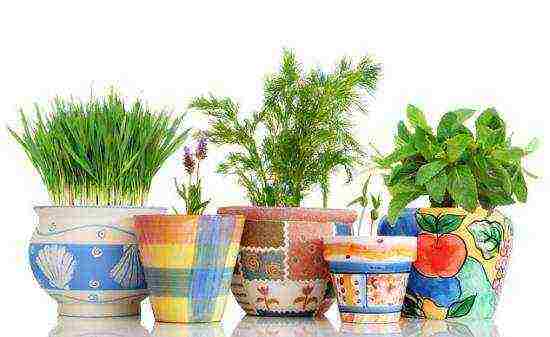
- Aesthetics.
It is not for nothing that the green color is considered soothing, and in summer, when the foliage on the trees and the grass on the lawn are in the juice itself, no one would think of complaining about its abundance and annoyance. So a few bushes of greenery, or even better - flowering and fruiting plants, at least, will delight the eye.

- Practicality.
Rationalists and skeptics, when choosing between geraniums and parsley, will certainly prefer the latter - not only beautiful, but also delicious.
- Saving.
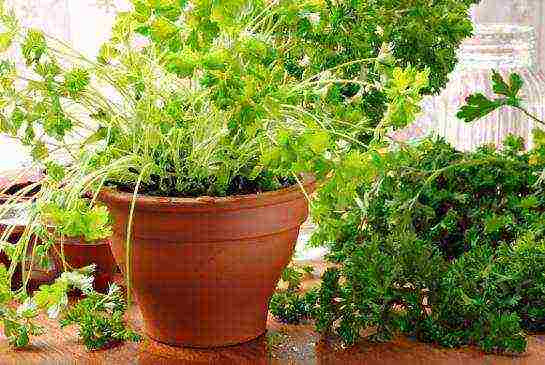
Greens and fresh vegetables, which are also quite realistic to grow on your own window in February, are expensive in winter, and the quality and taste, nevertheless, leave much to be desired. Whether it's the fruits of their own labors - both tasty and free, and pleasure in the process and in the result.
- Great pastime.
How often, especially among women, hands itch on cold winter days from the desire to do something or make something. Someone knows how to knit, someone can sew, and someone may well find in themselves an outstanding gardener-experimenter, who no, no, and will move, as soon as it gets warmer, from the windowsill into a real vegetable garden.
- No complications.
No matter how it may seem to a novice gardener that growing plants, and even more food, is the lot of the elite, there is really nothing difficult in regularly harvesting the same green onion. On the contrary, it may be easier and more interesting than growing even the most unpretentious indoor plants.
In order to start breaking a vegetable garden on the windowsill, you will need the following:

- Containers.
Most reliable are plastic or clay. Each type of plant must have its own capacity.
- Priming.
It is easier and better for those who decide to start gardening for the first time, to buy soil in a specialized store.
- Drainage.
As drainage, there can be purchased gravel, or, say, broken brick or small pebbles from the nearest reservoir.
- Fluorescent lamps of the white spectrum.
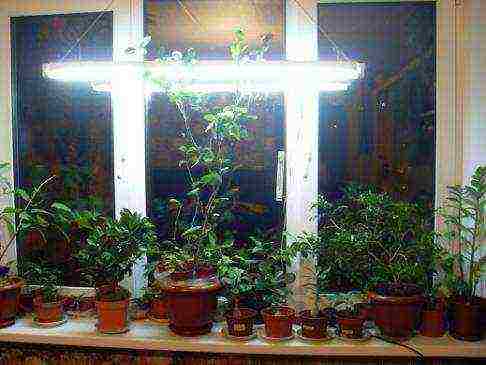
It is absolutely necessary, especially for the northern winter, to extend the daylight hours for plants at least up to 13-15 hours.
With the listed minimum of adaptations and a great desire to get the result and enjoy the process, the winter harvest will be inevitable.
Fresh greens all year round
The easiest way to grow greens is not only in summer beds, but also on the windowsill.
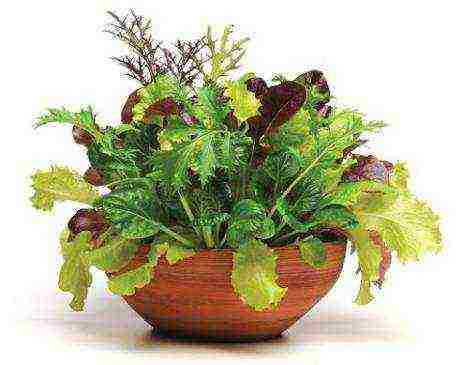
The green onion is the undisputed leader here, but there are other tasty plants that are easier to grow on a window:
- parsley and dill;
- cilantro and basil:
- thyme and mint;
- lemon balm and spinach;
- sorrel and rosemary;
- lavender and tarragon;
- celery and salad, etc.
The cultivation of each of them has its own nuances, but in general, the process is not difficult.
Onion
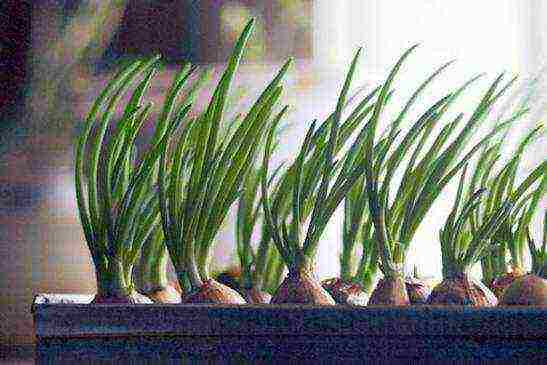
Oddly enough, in the first place in the composition of both onions and its green feathers, nothing more than sugar! It is presented in the plant in the form of fructose, inulin, maltose and polysaccharide. On the second and third place in the composition of the beloved plant and part-time food are proteins and ascorbic acid. But the specific flavor of the onion is given by the essential oil, which is contained in it in negligible quantities, but nevertheless creates the whole reputation.
Green onions can be grown in two ways:
- in small containers of water
- in shallow boxes with earth.
In the first case, only the lower part of the onion purchased in the regular vegetable department should be in the water, and the water should be changed once or twice a day.
In the second case, only the lower part of the bulb and roots are also in the ground.
As soon as a few long enough green feathers have appeared, you can cut the first crop and enjoy the fresh herbs in the salad.
In exactly the same way as onions, you can grow garlic from cloves in which a green sprout has hatched.
Seed greens
When planting dill, parsley or, say, cilantro, you need to be patient, because the first harvest will not be earlier than in a month if you choose an early ripening variety, and almost two months later if you choose a late ripening variety. Experienced gardeners recommend not to bother with a choice at all and plant several varieties of your favorite greens that ripen at different rates, because each of them has its own taste characteristics, each looks different, which will help to decorate your salads on the festive table in an unusual way.

So, early ripe dill varieties "Grenadier" and "Gribovsky" are quite unpretentious and resistant to various kinds of diseases, mid-season varieties "Aelita" and "Richelieu" give more fragrant greens, and late-ripe "Kibray" and "Salut" are distinguished by yield and higher content vitamins and other nutrients. The same goes for parsley, cilantro (coriander) and other types of greens.
How to grow dill from seeds:
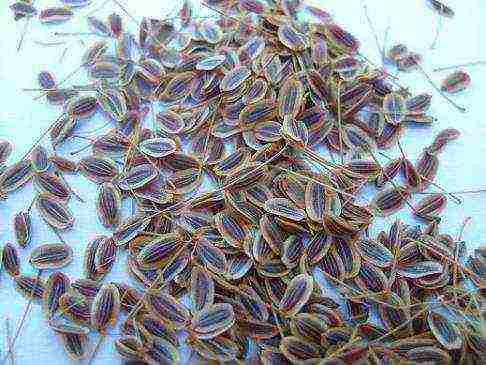
- Soak the seeds in warm, unboiled water for about a day, remembering to change the water every 6-7 hours.
- After a day, dry the seeds and plant them in a well-moistened ground. You can sow in beds, sprinkling with earth to a height of a couple of centimeters.
- Next, cover the pot with plastic and send it to a dark, warm place for about a week.
- After the first shoots appear, gradually reduce the temperature, first for a short time, and then leaving it on the windowsill longer and longer.
The dill should be watered abundantly and the temperature should be kept at 18-20 degrees Celsius. If you add new seeds every 3-4 weeks, then you can provide yourself with fresh dill for several months.
To grow parsley from seeds, you need:
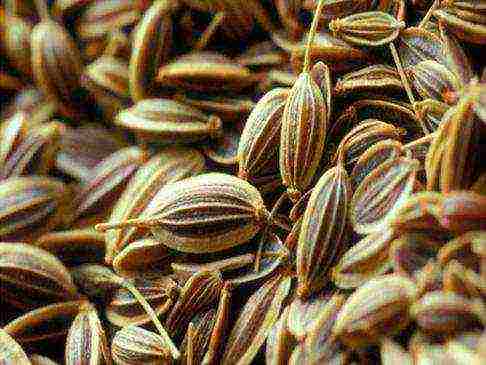
- The seeds, wrapped in damp gauze, should be kept in a cool, dark place for a week, not forgetting to constantly moisten the gauze.
- After a week, the seeds must be sown to a depth of half a centimeter.
- Then cover with a wet cloth and water once every 2 days while waiting for the shoots.
- When sprouts appear, you need to transfer the box to the windowsill.
Parsley does not like dry soil or waterlogged soil, so it is worth watering it once every 3-4 days and maintaining the temperature at 22-24 degrees Celsius.
Parsley, celery and root vegetable salad
It is even easier and faster to start getting a crop, after waiting a minimum of time and spending a minimum of effort, if you use purchased greens in a pot.
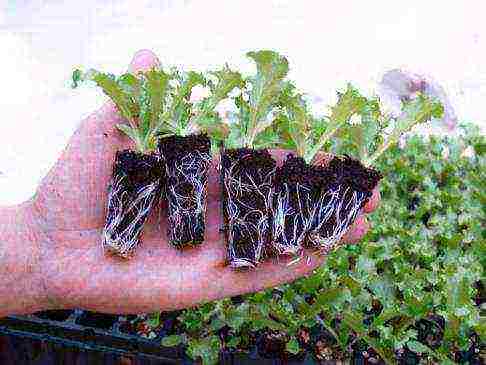
In winter, lettuce, parsley and celery are often sold in pots, which most buyers throw away after eating the greens. But if you choose a pot with a good intact rhizome a couple of centimeters wide for parsley and about five centimeters for celery, plant them, leaving the cuttings on the surface, then very soon you can get a new crop of greens.
How to grow vegetables in the winter on the window
Despite the fact that the apartment, it would seem, is the same greenhouse in which tomatoes, cucumbers and peppers bear fruit in northern latitudes, there is one significant feature due to which the cultivation of vegetables in winter (in addition to a short sunny day) is significantly difficult, namely limited area of the pot. Due to the small amount of land provided to the plant, it needs noticeably more attention and care, as well as time in order to start bearing fruit.
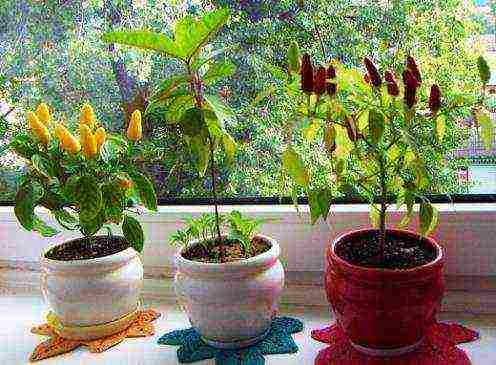
When choosing vegetable seeds for the future vegetable garden on the windowsill, you should prefer those that combine all the signs listed below:
- self-pollinated hybrids (among them there will be no barren flowers guaranteed);
- undersized (so that there is enough window height);
- small-fruited varieties (because they ripen faster).
For those who want to grow tomatoes on a windowsill, it makes sense to consider the cherry variety. The well-known tomatoes measuring 2-3 cm in diameter have been cultivated for a little over 200 years and were first brought from Peru and northern Chile. Caring for them does not differ from other varieties of tomatoes, but the fruits ripen much faster due to their size.

To grow vegetables you will need:
- a pot with a volume of 3-4 liters for each individual bush;
- land purchased from a specialized store;
- drainage.
The process of growing a fruiting plant is as follows:
- We disinfect the seeds in a pale pink two percent solution of potassium permanganate for 2-3 hours.
- After a couple of hours, we take out only the seeds that are at the bottom, and put them on a dry cloth or cotton pad to dry.
- We plant seeds in disposable cups. To do this, put up to 5 seeds in the rammed earth, and then sprinkle it with earth with a layer of 1.5-2 cm.
- After germination, we thin out the plants, leaving the strongest ones until one bush remains.
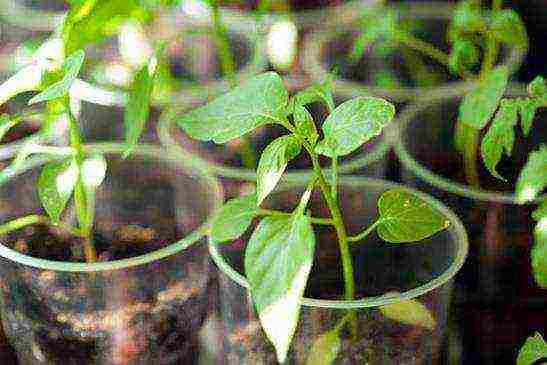
- After about a month, we transplant the seedlings into large pots. To do this, we overturn the glass, holding the plant with our fingers, and then we put the seedling in a large pot and fill up the earth.
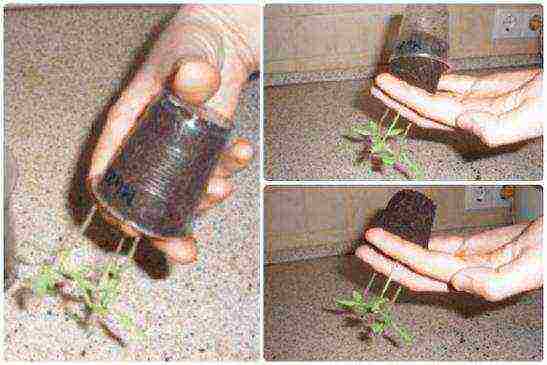
The first time you need to water the plants regularly, but in no case overmoisten. In winter, it is better to leave the ground a little dry than too moist, and with the arrival of spring, on the contrary, increase watering.
Daylight hours for plants, regardless of the real sun, should be at least 10-12 hours due to artificial lighting, and the temperature should be at least 20 degrees. Also, the plant must be turned 180 degrees once a day in order for it to grow evenly, without bending too much towards the sun.
Is it possible to grow exotic plants at home in winter?
There are two opposing opinions about growing exotic plants at home: some believe that it is almost impossible, others do not see anything complicated in this and even demonstrate lemons and grapefruits grown with their own hands.

The fact is that citrus trees traditionally grow in Russian houses, despite the unsuitable climate, and there are both successful and negative experiences here. And all because someone is content with a beautiful tree with fleshy leaves that never fall and saturate the room with the cleanest air, and someone certainly wants to see ripe fruits and considers their absence an unsatisfactory result.
In fact an unprocessed lemon or orange seed purchased from a regular store has a 90% chance of growing a beautiful citrus tree... But in order to ennoble your plant into a so-called cultivated tree and subsequently get a harvest, you need to take into account many nuances and even take advice, or even the help of a specialist.
Nevertheless, nothing is impossible, and if you take into account how long an exotic tree develops, then its seed can be planted at any time, and what to do then - be content with little or do everything in order for it to start bearing fruit - decide over time as its development.
How to grow lemon at home from seeds (video)
In order to enjoy greens all year round, both on the window and in the salad, there are absolutely no obstacles. It will take more effort to grow vegetables on your windowsill, but it's easier to do than it might seem at first. But it will be a little more difficult to become a real gardener, able to boast of your own lemons, at least because of the greater amount of time that will need to be spent, but there is nothing impossible here either.
In winter, there is a lack of fresh greens and vegetables from the garden. What can be grown on a windowsill to enjoy natural products? The list of crops suitable for apartment conditions is wide enough - from parsley and lettuce to tomatoes and cucumbers.
You can grow greens on a windowsill in winter or summer the same way as in a vegetable garden. But it should be borne in mind that some plants are quite demanding. In this article, we'll look at easy-to-care crops.
If you are a novice gardener, and therefore do not know what can be grown on the windowsill, then it is better to start with green onions, watercress, parsley. And spicy herbs - basil and rosemary - not only come in handy in the kitchen, but also spread their aroma throughout the apartment. More experienced hobbyists can start right away by growing cucumbers, tomatoes, and peppers.
Children will also like the winter garden. Even a toddler can grow green onions on a windowsill. Caring for plants will not only enthrall the child and give him a new and useful experience, but also provide him with vitamins.
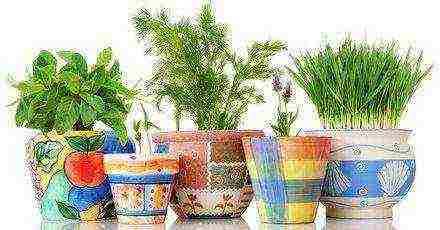
Training
After you have decided what to grow on the windowsill, you need to prepare the pots, soil, seeds. The set is the same for most cultures. Experienced summer residents who know how to grow seedlings on the windowsill already have almost everything they need.
To arrange a vegetable garden on a windowsill, you will need deep boxes or wide flower pots for planting plants. They can be fitted with plastic covers to create a greenhouse effect. For these purposes, you can use ordinary plastic bags.
Fill the pots with soil from a flower shop or a self-prepared substrate. It is better to refuse to use the land from the garden or vegetable garden, since insect larvae and weed seeds can remain in it. If the ground from the street is not prepared and ignited, then there is a high probability that one weeds can be grown on the windowsill.
You also need to prepare a container for settling water - delicate young plants should not be watered directly from the tap. You will also need a spray bottle or a small watering can.
Foil placed behind the plants to reflect sunlight is also helpful. If foil is not used, boxes and pots with plants must be turned 180 degrees daily, otherwise they will tilt towards the window and grow crooked.
If the plants are grown in spring and summer (planting in February-March), then they will have enough sunlight from the street. But a winter garden planted in the fall will require additional lighting. For this, fluorescent lamps are suitable.
It should be understood that only undemanding herbs can be grown on a windowsill in winter without backlighting, but you will not be able to get a good harvest of tomatoes without using phytolamps.In winter, on sunny days, you will need additional lighting in the evening, but in cloudy weather, the lamp will have to be turned on for the whole day.
Green onions
How to grow onions on a windowsill is shown to children in kindergarten. This is the easiest crop to grow at home, it does not require much maintenance, grows quickly and is very useful.
For forcing a feather, you can use both large onion sets (samples) and ordinary turnip onions. The feathers from the small bulb are more delicate, but the small head depletes quickly. A large onion produces abundant greens for a longer period.
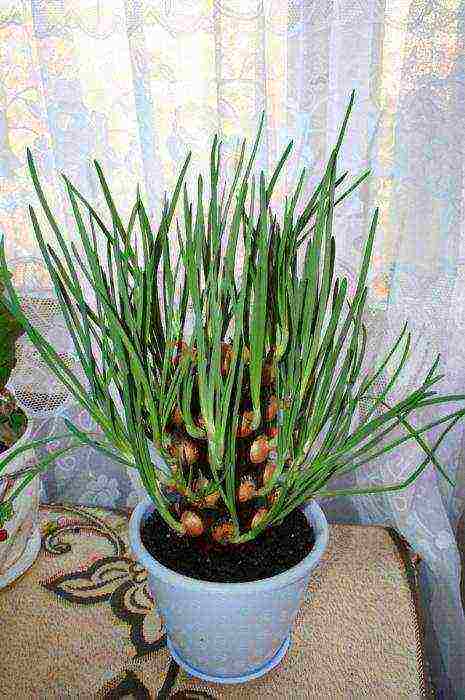
Not only self-grown onions are suitable, you can also use those purchased in a supermarket or a store for summer residents. The easiest way to plant onions for forcing is in water. To do this, you need to take a small glass and fill it with plain water or nutrient solution. The bulb must be installed so that only the tip touches the surface of the liquid. You need to change the water every day.
When planted in water, the bulb can start to rot and give off an unpleasant odor. This can be avoided, since it is possible to grow onions on the windowsill with planting in the ground. Place the substrate in a shallow plastic box. If there are no drainage holes at the bottom of the container, then it is reasonable to pour a small drainage layer of expanded clay, pebbles, broken bricks, etc. to prevent root decay.
You do not need to deepen the heads, plant it tightly, the bulbs are not afraid of close proximity. Planting must be watered frequently, preventing the soil from drying out. Do not use all the seed material at once, it is better to split it into several portions and plant it with a difference of 2-3 weeks, then there will be enough fresh onions for the whole winter.
Green onions can be grown not only in crates. Forcing onions can be planted vertically. To do this, you can purchase a special flowerpot in a store for summer residents or make holes yourself in a plastic bottle filled with soil.
Watercress
What can a beginner grow on a windowsill? Another simple crop to grow on a windowsill is watercress. It is known for its beneficial properties, and its unpretentiousness makes it one of the most common salads to grow at home. Watercress is ready for use in 2-3 weeks after planting. The seeds can be purchased at the gardener's shop.
You don't need a deep container to grow lettuce; a regular tray will do. As a substrate, you can use a thin (about 3 cm) layer of clay or peat soil, folded several times cloth, cotton wool or paper towels.
You need to plant watercress densely so that the young plants support each other. Press the seeds a little into a damp substrate. The plant does not require additional lighting, it is enough to place it on the windowsill.
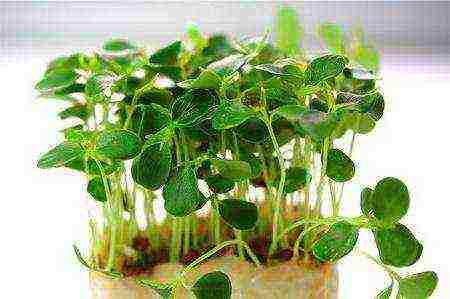
How to grow salad on a windowsill? The main thing is to prevent the soil from drying out, although you shouldn't pour the salad either. Does not like the plant and heat. The optimum temperature is not higher than 18 degrees Celsius. To avoid overheating in winter, it is enough to move the container with the salad closer to the window.
In order for the green watercress to be present on the table all the time, you need to plant it according to a scheme convenient for you. You can sow a new container every week or two, or add a small amount of seeds every 3-4 days.
Leaf salad
Growing lettuce is already a little more difficult. To know how to grow a salad on a windowsill, you need to take into account the variety of the plant being grown. The varieties Lollo Rossa, Lollo Bionda, Odessa, Vitamin, New Year, Red Credo show themselves best in an apartment.
In the fall and winter, lettuce will need additional lighting. If the room is hot and dry, the plant does not receive enough moisture, then the leaves will become bitter, coarse, and flower stalks form quickly.Lettuce loves moisture, coolness, feels good on a glassed-in balcony until late autumn.
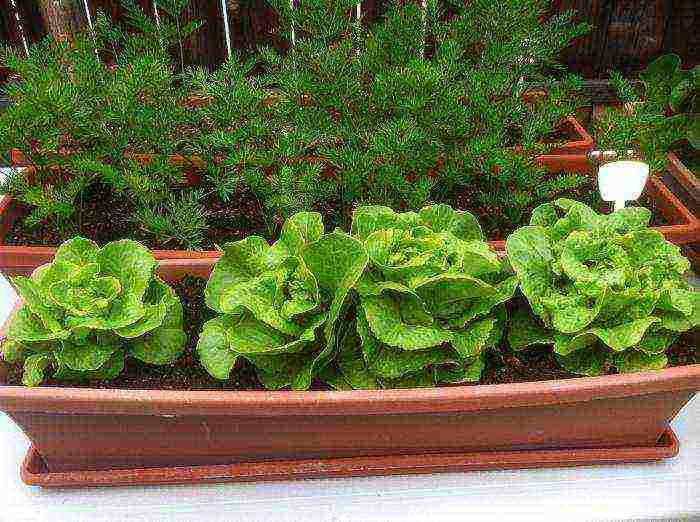
Lettuce is planted in the ground quite tightly, at a distance of 1-2 cm. Before the first shoots, the container is covered to create a greenhouse effect. Over time, thinning will be needed at a distance of 4-5 cm. The plant needs watering and good lighting.
After the bushes begin to release arrows, they become unusable. They can be removed and new seeds can be planted in their place.
Parsley
Many housewives are wondering how to grow parsley on the windowsill. After all, it often takes only a few leaves of this plant, and you don't want to buy a whole package in the store. In spring and summer, parsley can be grown from seed. The plant is light-requiring, so in the winter it will need additional lighting. Seeds germinate rather slowly, but the bush will also serve for a long time. Parsley is not demanding at temperature, it grows well on the windowsill or on the balcony. The plant is hygrophilous, watering is abundant. In winter, water the parsley less often.
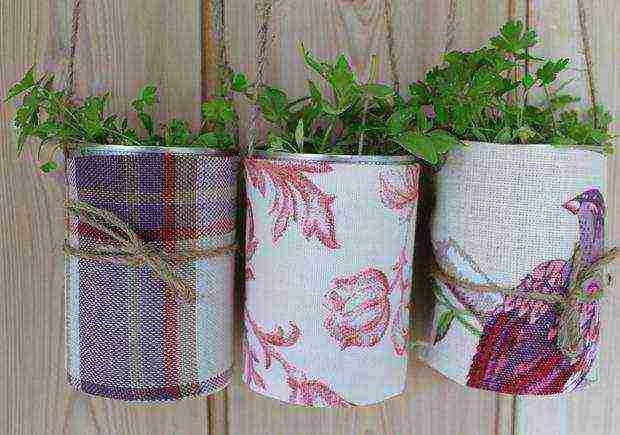
It will be possible to cut the first greens only after a month and a half, but it will be possible to do this for a whole year. Before planting, it is better to soak the seeds in a solution of potassium permanganate. You can plant parsley in small containers, in peat cups or directly in flowerpots.
How to grow parsley on a windowsill in autumn and winter, because growing from seeds at this time is too long and laborious process? There is another way - forcing from the rhizome. This method is somewhat simpler and better suited for the autumn-winter period. Planting material can be prepared independently on a personal plot or bought at a regular grocery store.
The rhizome should be healthy, without signs of wilting, and the apical bud should be intact. The root crop must be placed in a pot and sprinkled with moist soil. Roots that are too long can be planted obliquely.
The first green shoots will appear within a few days after planting, and the leaves can be cut off in a couple of weeks. Greens will appear on the rhizome within six months.
Basil
What can be grown on the windowsill besides the usual onions, parsley, lettuce? Something more exotic like basil or rosemary.
The type of basil doesn't matter, either green or purple will do. Basil can be propagated using both seeds and cuttings. The plant is thermophilic - the optimum temperature is 20-25 degrees, and it is hygrophilous - good drainage and abundant watering are required.
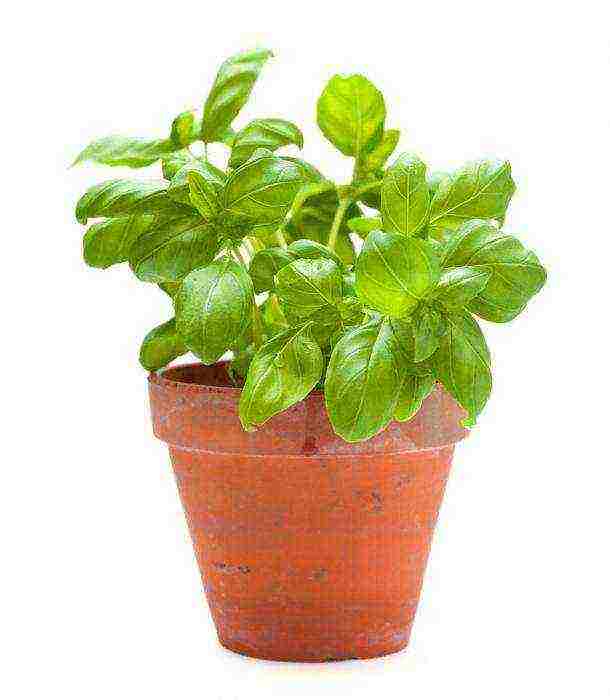
Cutting is a quick way to grow basil. You can just buy a few twigs from the store, put them in water and after one to two weeks move the seedling with roots into a pot. Young shoots will be ready for cutting in a couple of weeks. It is better to cut off side shoots.
Basil, planted by cutting, grows quickly, but blooms quickly too. As you know, after the beginning of flowering, the plant is unsuitable for food. To have fresh basil on your table all the time, you need to update the planting every 3-4 months.
Planting basil with seeds will take more effort. But such a bush will not bloom for about a year. Seeds need to be soaked, covered, sprouts must be transplanted into pots. It is better to grow basil using seeds in spring, since additional lighting will be needed in winter.
Rosemary
Rosemary in a clay pot on the windowsill will not only decorate the kitchen, but also come in handy when cooking. This plant can be grown in the summer in the country, and in the winter it will feel great at home.
You will need a wide pot in which a thick drainage layer is poured. Rosemary is picky about light and air. He prefers the south side, and in summer, the pot with the plant must be planted in the open ground, taken out on the balcony or out the window, otherwise the leaves will not accumulate a sufficient amount of essential oils.
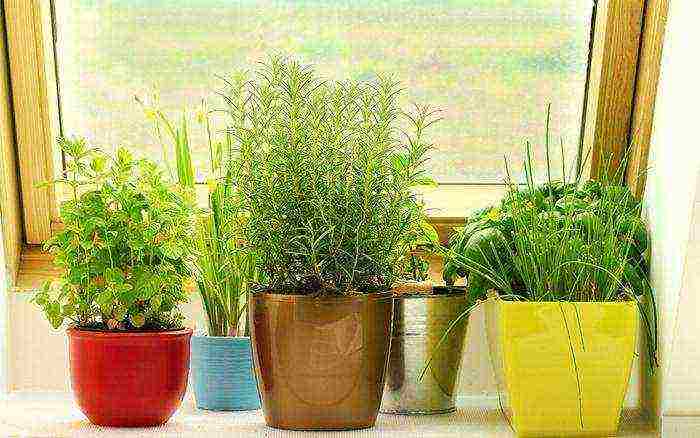
For planting rosemary, both seeds and cuttings are suitable. The seeds of the plant have poor germination. They need to be soaked for 2 days, then put on the ground, without sprinkling on top, covered with a film and sprayed every day from a spray bottle. If seedlings do not appear after 4 weeks, new seeds are planted. When the seedlings release three or more leaves, they are planted in spacious pots.
It is easier to grow rosemary using cuttings. This requires a stiff plant shoot. It is placed in a container with water or wet sand, and after rooting, it is transplanted into a pot.
Rosemary likes frequent but moderate watering. It is better to overdry the soil than to fill it. With a lack of moisture, the lower leaves of the plant will begin to turn yellow, and with an excess, the roots will rot, which will lead to the death of the plant.
If in winter the plant is provided with a low temperature (up to 5 degrees), then in spring the rosemary will bloom. An adult plant needs to be constantly trimmed to form a bush.
Cucumbers
Growing cucumbers on a windowsill in winter is a pretty tempting prospect. This can be done not only by an experienced gardener, but also by a beginner. Cucumbers grow quite quickly, you can get the first harvest in a month and a half.
Not every variety of cucumbers is suitable for growing on a windowsill. First, it must be self-pollinated. During flowering, the bush must be shaken daily for pollination to occur. Secondly, it will be much more convenient if the plant is bushy. Thirdly, an early variety is better suited for home cultivation. Finally, a shade-loving plant is ideal. You can grow cucumbers on the windowsill in the winter of the varieties Connie, Masha, Legend, Debut, Flight, Babylon. Knowing the necessary parameters, you can choose another variety.
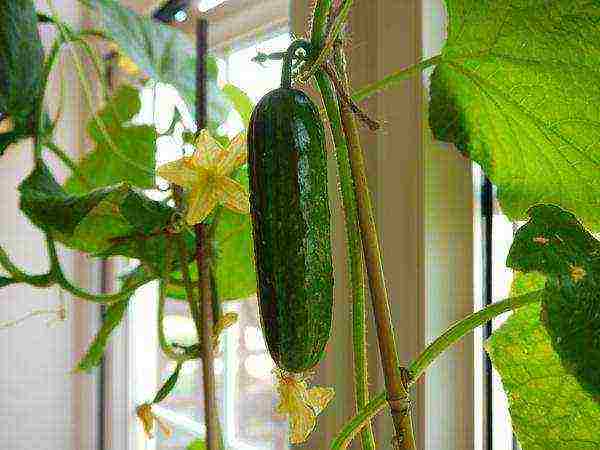
Growing cucumbers at home has its own subtleties. After all, providing all the necessary conditions can be difficult. Cucumbers are photophilous, so windows on the south and east sides are suitable for growing them. If there is still not enough light, then additional lighting with fluorescent lamps will be needed.
The temperature in the room should not be lower than 20 degrees, so you should not move the flowerpots too close to the cold window. Cucumbers are very fond of moisture, so you need to make sure that the soil does not dry out. The pot with the plant can be placed in a bowl of water. Leaves need to be sprayed with a spray bottle twice a day.
Tomatoes
It seems to many that growing tomatoes on a windowsill is very difficult and inaccessible to a beginner. But this is not at all true! Moreover, there are special varieties for indoor cultivation.
When visiting a gardener store, note that some seed packages say “Recommended for pot growing”, “Harvest on the window”, “Home garden”. And the names of the varieties themselves are speaking - Room surprise, Balcony miracle, Japanese room. There are also ampelous varieties that will look great in pots - Peruvian home, Cherry, Talisman.
Even if you don't find special indoor varieties, regular ones will do. Please note that these tomatoes should be determinant (undersized, or better dwarf), self-pollinated (for pollination, the bushes are shaken during flowering) and small-fruited. For example, Alaska, Bonsai, Bonsai micro, Pearl (red and yellow), Canada News, Minibel, Pinocchio, etc.
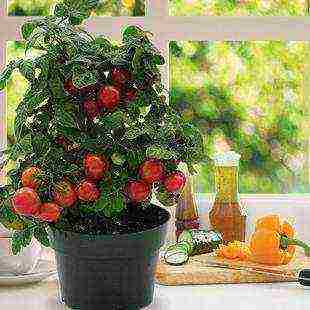
Tomatoes can be planted directly in large pots or pick the strongest sprouts. During flowering and fruit setting, tomatoes should be watered abundantly and the leaves should be sprayed.
The room where tomatoes grow must be regularly ventilated - plants do not like stagnant air. In winter, they need additional lighting. The plant needs to be fed periodically. The first fruits can be obtained in 3-4 months.
Tomato is a perennial plant. At home, with good care, it will bear fruit for several years.After a period of active fruiting, the bush needs to be transplanted into a larger pot and renewed by pruning the branches. In addition, the tomato can be propagated by cuttings. A plant grown from a cuttings will start blooming within a few weeks.
Sweet pepper
How to grow pepper on a windowsill? This is no more difficult than growing tomatoes. True, it will take longer to wait for the harvest - 5-6 months. But pepper is a perennial plant, with good care, annual transplantation and pruning, it will bear fruit for several years. The plant can be propagated not only by seeds, but also by cuttings. Caring for a pepper is also similar to caring for a tomato, but with one significant difference - if the tomato does not tolerate stagnant air, then the pepper is afraid of drafts, so it is better not to settle them on the same window.

Self-pollinated early-ripening varieties are best suited for growing in an apartment - California Miracle, Oda, Jupiter, Patio-Ivo.
Pepper needs good illumination, warmth, loose soil (it is necessary to regularly loosen the soil). This plant is not capricious, and will delight you with its fruits for a long time. Hot peppers can also be grown at home, but these plants should not be in the same room, otherwise cross-pollination will occur.
In winter, you really want fresh herbs, fragrant berries, fruits and vegetables. I would like to, but my hand unconsciously puts back the just taken package with Turkish tomatoes and cucumbers ... Just know how much real-life there is ...
And imagine: cucumbers, tomatoes, peppers, and greens in the midst of winter you can grow yourself without leaving your home - on your two or three windowsills! And along the way, create a summer cottage landscape right in your apartment. No, no, no kidding, if you decide today, and tomorrow you go to the store for seeds, then on March 8, the first cucumbers may already appear on your bushes, and the grown bushes of tomatoes, peppers and beans will make your windowsill green and joyful in summer !
And let us convince you that it is interesting, exciting, important, necessary and not difficult at all! We can grow at home cucumbers, tomatoes, sweet and bitter peppers, carrots, beans, garlic, celery, herbs ... oh-oh-oh, how many things!
Well, let's get it in order?
Cucumbers
Growing cucumbers at home is a very tempting idea. Just imagine: you wake up in mid-March, go to the window, pick a couple of young cucumbers from a green bush, and five minutes later there is a healthy vegetable salad on the table ... And what a smell all over the apartment!
If a thought flashed through you now: "Maybe I should try?" - here are some arguments to help you decide:
- Cucumbers grow very quickly: literally 7-9 weeks after planting, you can cut a salad from your greens!
- It is quite possible to grow cucumbers at home not only for a summer resident who has already "eaten a dog" in vegetable growing, but even for an inexperienced city dweller.
- And a control shot: just imagine how delighted your friends, colleagues and neighbors will be with young cucumbers on your windowsill! You will become an object of ah and ah for a long time))
Want to see how it might look? And here's how in this video:
Stop, stop, do not urgently run after the seeds that you have prepared for summer cottages! Everything is in order. First, we carefully read what you need to know and take into account when growing cucumbers at home.
Suitable varieties
Not all cucumber varieties are suitable for indoor growing. You need to choose
self-pollinated
hybrids ... It's best if they will
early maturing ... Even better - if they are also
bush ... And then -
shade-tolerant ))
Excellent proven themselves hybrids:
- ‘Marinda F1’
- ‘Onega F1’
- 'Masha F1'
- ‘Connie F1’
- ‘Legend F1’
- 'Claudia F1'
- ‘Tatiana F1’
- ‘Seryozha F1’
Good reviews are also about varieties:
- ‘Gribovchanka’
- 'Debut'
- ‘Zozulya’
- ‘Ragtime’
- 'Babylon'
- 'April'
- 'Flight'
- ‘Boyfriend’
- 'Athlete'
- ‘Kinglet’
- ‘NIIOH-412’
- ‘Cucaracha’
If you are just starting to grow cucumbers at home, choose from these varieties, you will not go wrong.
The necessary conditions
Cucumbers, like any other plant, have their own preferences. They are:
- photophilous, therefore, the eastern or southern side of the apartment (house) is best suited for growing them. If there is not enough light (and most often this is exactly the case), it will be necessary to organize additional lighting with fluorescent lamps.
- thermophilic, they need a temperature above + 20 ° C (at least + 22 ... + 24 ° C during the day).
- hygrophilous, therefore, the soil should always be moist (moderately, not overfilled).
Tomatoes
A red tomato is clearly not a winter or spring vegetable. Therefore, fresh tomatoes from your garden in April and May are an indescribable pleasure (and pride, whatever you say!).
Many do not dare to grow tomatoes in an apartment, fearing that they simply will not succeed. You know, the bushes strewn with red fruits on the windowsill are only at first glance "how difficult it is to be horrified." Anyone can grow tomatoes at home. Almost everyone grows flowers in their apartments, and this process is no less complicated 🙂
If you are eager to try your hand at growing homemade tomatoes, heed the advice of our experienced summer residents.
Suitable varieties
Suitable for a home garden self-pollinated hybrids... Do not mess with tall varieties - you will suffer. Better to chooseundersized (or even dwarf ones). It is also worth sacrificing love for large tomatoes, it is better to plant small-fruited varieties - they ripen faster and easier.
There are a lot of tomato seeds on sale today of those varieties and hybrids that are specially designed for home cultivation:
- ‘Balcony miracle’
- ‘Room surprise’
- ‘Balcony Red F1’
- 'Alaska'
- ‘Betta’
- ‘Pearl red’
- ‘Pearl yellow’
- ‘Bonsai’
- ‘Japanese room’
- ‘News of Canada’
They enjoy special love
dwarf:
- ‘Minibel’
- 'Bonsai micro F1'
- ‘Pinocchio’
- ‘Florida petite’
- ‘Cherry Pygmy’
- ‘Lisa F1’
- 'Greenfinch F1'
Ampel varieties that look great in hanging pots are wonderful - such as:
- ‘Cherry’
- ‘Talisma’
- ‘Yellow pear’
- ‘Peruvian home’
- ‘Ildi’
Advice
: The store will offer you quite a few varieties of tomatoes, assuring that they are great for home growing. Listening to this and believing the seller, you still carefully read what is written on the packaging: the bags we need have special marks “Home garden”, “Harvest series on the window” or “Recommended for pot growing”. Now, if you saw such an inscription - feel free to pay money)
The necessary conditions
Caring for "home" tomatoes is not much different from caring for them in the country or in a personal plot.
- Tomatoes - plants light-loving, therefore, it is advisable for them to choose the south, southeast or east side. In winter, in an apartment, they need lighting (you can read more about lighting in the article 10 secrets of a home garden).
- They do not like stagnant air, they are afraid damp rooms.
- And here are not afraid of drafts, so feel free to ventilate the room where the tomatoes "live".
- Optimal daytime temperature for growing: before flowering and fruiting - + 22 ... + 25 ° C (night - about + 17 ° C), and then - preferably 2-3 ° C higher.
- Watering, as in the open field, requires rare but abundant.
Advice:
if you want the tomato bush to be symmetrically developed and beautiful, turn it 180 ° daily in relation to the light from the window - then it will build up the green mass evenly from all sides (some owners turn the pots with bushes by 90 °, considering that there will be even more evenly))
Sweet pepper (bulgarian)
This southern juicy vegetable is quite suitable for "domestication", it is unpretentious, beautiful and very useful.Although you will have to be patient - you will be able to taste the first sweet peppers only 5-6 months after germination.
Growing it at home is interesting, to say the least. Yes, and profitable as well. How is it profitable? Yes, because pepper is a perennial plant, and the bushes planted today will delight you with their harvest for 2-3 years. Tempting? And then! If you decide to add bell peppers to your windowsill, get acquainted with the secrets of growing it.
Suitable varieties
As in the case of cucumbers and tomatoes, for a home garden you need to select early maturing self-pollinated hybrids... In home culture, varieties have proven themselves best. universal purpose, used both for planting in open ground and in protected:
- indoor pepper 'Patio-Ivo', which pleases with its bright yellow fruits at any time of the year on the windowsill or balcony;
- thick-walled peppers of the improved selection ‘California Miracle’ - up to 75 cm high, with beautiful bright red fruits with a ribbed surface;
- medium-early high-yielding hybrid of Dutch selection 'Jupiter F1' with very large fleshy fruits that change color from green to red;
- very sweet pepper of the 'Oda' variety - purple in color, undersized (35-50 cm) and very productive.
Good reviews received medium early varieties:
- 'Martin'
- ‘Bulgarian-79’
- ‘Gift of Moldova’
- ‘Novogoshary’
- 'Winnie the Pooh'
The necessary conditions
Bell pepper will not be "capricious" and will thank you with a good harvest, if you observe several important conditions for it:
- This plant is southern, so it must be placed in the sunniest room, where there is most of the light. If there is not enough light, it will be necessary to artificially illuminate it.
- Sweet pepper is a sissy, he does not like drafts.
- The optimum air temperature for its maintenance is + 20 ... + 26 ° C (at night + 18 ... + 20 ° C).
- Regular soil loosening necessarily.
- Pepper needs pest protection (aphids and spider mites).
- During the fruiting period, pepper is needed tie up to the trellis.
Advice: it is categorically not recommended to grow sweet and bitter peppers on the same windowsill (and in the same room) - as a result of cross-pollination, all your peppers will turn out to be bitter (a distance of 2-3 m to the next window sill is not an obstacle, you can not check it))
Bitter pepper
I think that bitter pepper lovers will never give up the opportunity to always have a bush with burning pointed fruits at hand ... for for them any dish with hot pepper becomes immeasurably tastier))
But to grow such a miracle on the windowsill is not difficult at all. To do this, you only need the presence of the sun in the window for 3-4 hours a day, a pot of soil, and the necessary seeds. And in 2-3 months you will have a gorgeous treasured bush, strewn with medium-sized fruits. And it is capable of bearing fruit in one place up to 5 years!
By the way, it is especially worth emphasizing that all representatives of "bitter peppers" are highly decorative and will certainly become a decoration of your home garden!
I don't think I had to persuade you)) It remains only to skim through a few lines of the necessary information.
Suitable varieties
For home cultivation, seeds of early-maturing self-pollinated varieties and hybrids are best suited. To the delight of hot pepper lovers, almost all varieties of hot pepper fully meet their purpose)
These are varieties and hybrids:
- ‘Astrakhansky 147’
- ‘Elephant trunk’
- ‘Ukrainian bitter’
- 'Indian summer'
- ‘Fire’
- ‘The Queen of Spades’
- 'Sweeties'
- ‘Carmen’
- ‘Superchile F1’
- ‘Curiosity’
Special feedback received two varieties of pepper:
- ‘Serpent Gorynych’ is a high-yielding, very spicy burning taste.
- The 'Elephant's trunk' is the largest-fruited of all hot peppers, reaching 27 cm in length.
The necessary conditions
In order for hot pepper bushes to grow and develop without problems, several basic conditions must be met from the very beginning.
- Prepare a quality soil substrate.
- Plants are best placed on south, southeast and southwest windows where most of the world... If there is a lack of lighting in winter, it is imperative to carry out additional lighting.
- To not allow drying out soil.
- Do not pinch, then the bush will be voluminous and "rich".
- During fruiting feedas it tends to be abundant and quickly depletes the soil.
Beans
Everyone can grow beans on the windowsill. Moreover, it is unpretentious, rises and grows quickly, does not require special care. It is a self-pollinating plant; in a month and a half it will bloom, and in two you will be removing young pods. They are incredibly tasty in vegetable stews, soups, omelettes and simply stewed.
Believe me, you will not regret it if you decide to "get" a couple of bean bushes).
Suitable varieties
Practice has shown that it is most profitable to grow at home early maturing varieties of asparagus bush beans... But also curly varieties shouldn't be written off. At the very least, they are very decorative - long bright green vines with large flowers of pink, purple or white look amazing. And you will not be left without a crop either.
Which beans to choose?
- has proven itself well black Eyed Peas ‘Fatima’.
- good reviews of summer residents received varieties bush beans ‘Triumph Sugar 764’, ‘Sachs Without Fiber 615’, ‘Mask’ and ‘Green Pod 517’.
- from curly beans it is recommended to choose either ‘Golden Neck’ or ‘Violetta’.
The necessary conditions
It is easy to take care of the beans, it is enough to provide them with regular watering, loosening and feeding and fulfill a few simple requirements:
- The container for growing bush varieties should be at least 2 liters in volume, and for climbing varieties - 30-35 liters.
- Bush beans more photophilous, it is best placed on the windows of the south and southeast side, curly can "live" on either side. Beans, as a rule, do not need additional lighting.
- Curly beans need ropes (wire, mesh) to supports.
- The yield of beans is increased feeding superphosphate and potassium chloride.
Carrot
Have you ever heard that carrots are grown on a windowsill? In a simple flowerpot or container, you can get a very decent harvest. Most varieties will allow you to start picking fresh carrots as early as 3.5 months after planting: when the majority of summer residents just start sowing carrots, you will already be eating them!
Carrots, of course, are capricious, but the main thing is to know a few secrets, and then you will "make friends" with it for a long time:
Suitable varieties
Carrots are remarkable in that the root crop, even when it has just been born, is already suitable for consumption. Therefore, growing it is a win-win business))
- For growing at home, it is best suited mini carrot of the Parisian Carotel variety - these are the ‘Parmex’, ‘Sophie’, ‘Grandfather’ varieties. It grows in 80-90 days and does not require much space - a pot or container is fine.
- You can also opt for early maturity sort ‘Amsterdam’.
- And kids will love the Round Baby round little roots.
The necessary conditions
You need to start with preparation lightweight and well-drained soil. This is extremely important: the easier it is to penetrate oxygen into the soil, the juicier and healthier the roots will be.
- Tank depth (container, pot, flowerpot) must be large enough for the roots to develop normally.
- Temperature the environment must be kept within the range of + 13… + 24 ° C.
- Carrot does not like direct sunlight.
- Watering requires regular (more often than in the open field). In this case, the presence of drainage holes is mandatory!
- To retain moisture in the soil, it is necessary to carry out mulching.
- Do not get carried away nitrogen fertilizers, you risk getting a lot of tops, not carrots.
Advice
: Carrots can be grown in cut plastic bottles. And cheap, and convenient, and mobile))
Home garden with herbs
Well, what kind of vegetable garden is without greenery? Onions, parsley, dill, salads, basil, mint ...
If you are a fan of greenery on the window, we advise you to read the articles on our website:
- 5 types of greenery that are easy to grow on a windowsill
- Growing green onions in a plastic bottle
- How to grow parsley on a windowsill
- How to grow delicious onions on a windowsill - secrets and subtleties
- How to quickly and easily grow watercress on a windowsill
- 10 secrets of the home garden
And finally, we suggest admiring the home garden of Nadezhda Shcherbinina. Any of us can make the same branch of a summer residence ... you just want to.
The more snow outside the window, the whiter the landscapes, the more we miss the bright colors of the past summer, the fresh biting sound of a jet from a hose, the whisper of herbs - at our dacha. Hands have long missed the ground, and oh, how long to my favorite beds ...
But it is in our power to reclaim a piece of summer and a summer residence. There is everything for this - desire and ... a window sill! Let me remind myself once again: if we start right now, then by March 8 we may already have our own cucumbers! Let's start?
Have you noticed that in winter you really want summer greens or a fresh cucumber from the garden, or even better a fragrant tomato. We are so arranged that we wish the impossible ... But who said that these dreams are impracticable. Even in winter, you can grow many garden plants at home - start a real garden on the windowsill. Let's talk in more detail about what can be grown on the windowsill in winter.
What greens and herbs can be grown on a windowsill in winter?
When you say greens, the first thoughts that come to mind are the cultivation of dill, parsley or lettuce. It's pretty easy to grow them at home. For this you need:
- Additional lighting
- Fertile soil and fertilizing
- Correct selection of varieties - you need to sow early varieties and hybrids
- Alternatively - see the label on the package - suitable for growing at home
 Different greens on the windowsill
Different greens on the windowsill
I advise beginner gardeners to start with unpretentious cultivation: green onions, parsley, watercress. For herbs, you can try rosemary and basil. They will not only come in handy as a seasoning, but will fill the apartment with their own aroma!
Now let's look at it step by step,
How to grow greens at home
Seed preparation
Before planting, it is better to soak the seeds overnight in warm water, and then put them in pink potassium permanganate for a couple of hours.
More details can be found in the article "How to accelerate seed germination."
Sowing
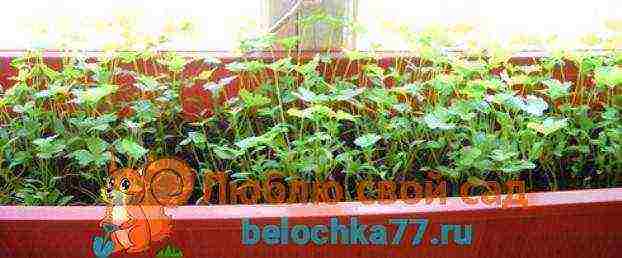
Any suitable sowing container can be used. From box and flowerpot to cake box. I like the latter option. After sowing, it is convenient to immediately close the mini-vegetable garden with a cake lid and create greenhouse conditions there. I remove the lid only after full shoots appear, and before that, every day you need to ventilate. Cover crates with plain plastic bags when seeding.
Use commercially available soil or roast your garden greens to get rid of pests and weeds. You need to water your home garden with settled water. Do not use tap water.
To prevent the plants from stretching towards the window, you need to turn the containers with plants every day.
How to grow onions for herbs at home
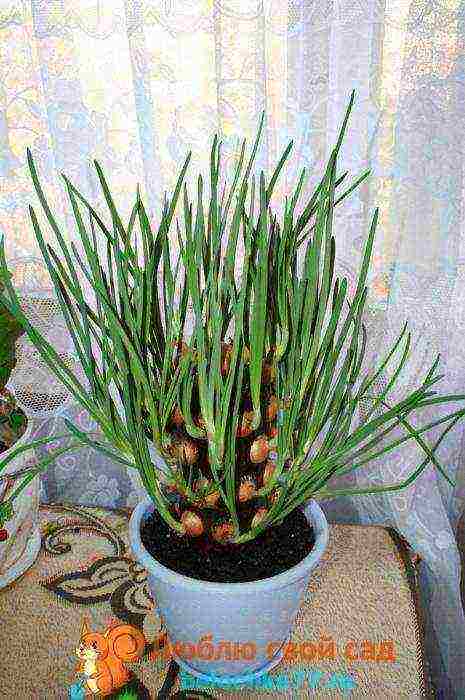 Onions on greens in a bottle
Onions on greens in a bottle
For this, turnip onions of early varieties are used. The late ones have a long shelf life and they will grow poorly.
It is the easiest crop to grow on a windowsill. Even children in kindergarten are trying to grow onions for feathers. It grows fast, useful, affordable.
It is better to use larger heads - they will provide you with vitamin greens longer.
The easiest way is to put the bulb in water - just so that the bulb only touches the water with its tip, otherwise it will start to rot.
You can plant the onions in the ground - close to each other. And water it regularly. If you make such a bed every two weeks, then you will provide yourself with greenery for the whole winter.
You can drive out onion greens in vertical containers. You can make them yourself. Cut holes in a plastic bottle filled with earth and insert into the holes of the onion.
What vegetables can be grown on a windowsill in winter?
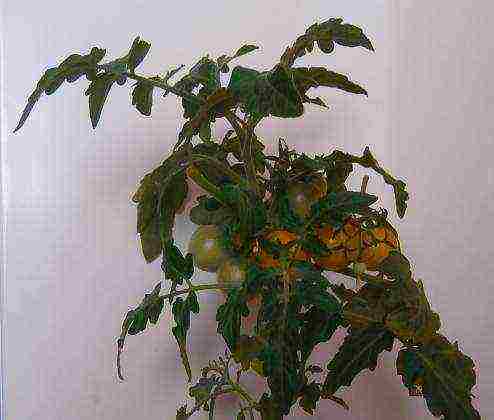 Homemade tomatoes
Homemade tomatoes
Many vegetables grow well on the windowsill if the conditions are right.
You can even grow cucumbers and tomatoes.
Read more in the articles "Growing cucumbers on a windowsill in winter" and "Growing tomatoes on a windowsill".
What conditions are needed for the growth of cucumbers and tomatoes on the windowsill?
- A lot of light - be sure to grow on the south, southeast windows.
- Use additional lighting, daylight hours should be more than 12 hours.
- Fertile soil, mandatory feeding with complex and organic fertilizers.
- Provide a suitable temperature for cucumbers - not lower than + 20 ° С
- The best results will be if you hide the young cucumbers under a plastic cover.
- Use only self-pollinated varieties.
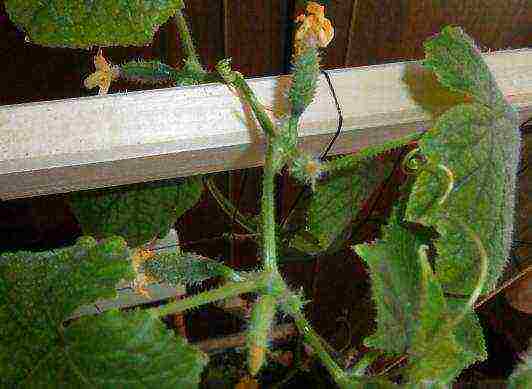 Small cucumbers at home
Small cucumbers at home
How to grow radishes at home
Few details in the article "How to grow radishes on the windowsill". The same lighting requirements must be followed as for all domestic crops. You also need to sow early varieties.
 Radish in a box on the windowsill
Radish in a box on the windowsill
Not only vegetables and herbs can be grown on a windowsill in winter. But also exotic plants. For example: tangerines, lemons, mangoes, avocados.
They grow well at home, despite their southern origin. All these plants don't make real trees. But the fruits can be obtained.
 Fruit-bearing lemon at home
Fruit-bearing lemon at home
You can read more in the articles:
- How to grow a tangerine from a bone
- How to grow a lemon from a seed
- Growing mangoes at home
I wish you to definitely plant a small vegetable garden on the windowsill. Now you know what can be grown on a windowsill in winter. Share your impressions and ask for advice in the comments.
Best regards, Sophia Guseva.


